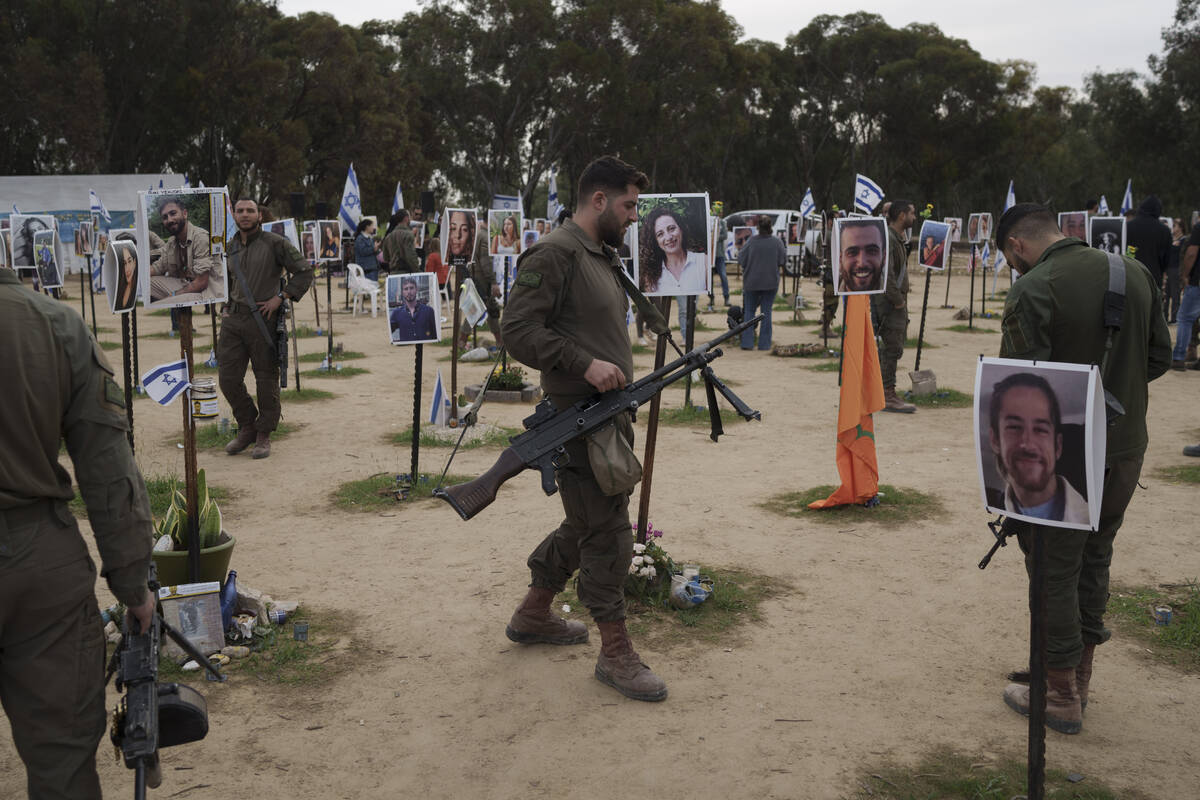Israel announces the death of another hostage

RAFAH, Gaza Strip — Israel announced the death of another hostage on Sunday.
Furious with the Israeli government and demanding the release of remaining hostages, relatives and others set up a tent camp outside Israeli Prime Minister Benjamin Netanyahu’s residence in Jerusalem and vowed to stay until a deal is reached.
Netanyahu, in a new statement, said he stressed in his conversation Friday with President Joe Biden that he rejects Hamas terrorists demands for a cease-fire, Israeli forces’ withdrawal and the release of Palestinians held by Israel in exchange for the remaining hostages.
He said that agreeing means another devastating Hamas terrorist attack “would only be a matter of time.”
Netanyahu also rejects calls from U.S, its closest ally, for postwar plans that would include a path to Palestinian statehood.
Gaza death toll climbs
The war began with Hamas’ attack in southern Israel on Oct. 7. Palestinian terrorists killed some 1,200 people, mostly civilians, and took about 250 hostages back to Gaza.
Israel’s military announced the death of 19-year-old Sgt. Shay Levinson, who was among the hostages. His date of death was given as Oct. 7, but there were no further details. According to Israeli media, his body is still in Gaza.
Israel has responded to the Oct. 7 attack with a bombing campaign and ground invasion. Ground operations are now focused on the southern city of Khan Younis and built-up refugee camps in central Gaza.
“The plumes of smoke from tanks, artillery and the planes of the air force will continue to cover the sky over the Gaza Strip until we will achieve our goals,” Defense Minister Yoav Gallant said.
Since the war started, 25,105 Palestinians have been killed in Gaza, the Hamas-run Health Ministry said. The Health Ministry does not differentiate between civilians and combatants in its figures.
Israel said 260 trucks of aid entered Gaza on Sunday, the highest number since the war began.
The Israeli military says it has killed around 9,000 terrorists and blames the high civilian death toll on Hamas because it positions fighters, tunnels and other terrorist infrastructure in dense neighborhoods. The military released footage of a tunnel under a residential neighborhood in Khan Younis where the army believes at least 20 hostages were kept at different times.
Israel’s military said the demolition last week of a key building at Israa University in Gaza was under review, and asserted that preliminary findings indicated Hamas terrorists had used the compound for military purposes.
Israelis increasingly divided
At the new protest camp outside Netanyahu’s Jerusalem residence, hostages’ families urged the government to act.
“It’s not logical that you’re telling us the war must continue, and you keep saying that because of military pressure we will release them, but we don’t see a single one released because of this pressure,” said Gilad Korengold, the father of hostage Tal Shoham.
Some top Israeli officials have begun to acknowledge that Netanyahu’s goals of “complete victory” over Hamas and returning the remaining hostages might be mutually exclusive.
A member of Israel’s War Cabinet, former army chief Gadi Eisenkot, said last week that the only way to free the hostages was through a cease-fire.
But Netanyahu’s coalition partners push him to step up the offensive, with some calling for the “voluntary” emigration of hundreds of thousands of Palestinians from Gaza and the re-establishment of Jewish settlements there.
Hamas is believed to be using the hostages as shields for its top leaders. Israel has rescued one hostage, and Hamas says several have been killed in Israeli airstrikes or during failed rescue operations.
Hostages’ families want an exchange like the one during a weeklong November cease-fire. Other Israelis are frustrated by the security failures ahead of the Oct. 7 attack and by Netanyahu’s handling of the war.
Near the site of an Oct. 7 massacre during a music festival, families of Israeli victims planted trees.
“What happened after 109 days? Nothing. We’re just still waiting,” said one father, Idan Bahat.
Magdy reported from Cairo. Associated Press writer Melanie Lidman in Jerusalem contributed.